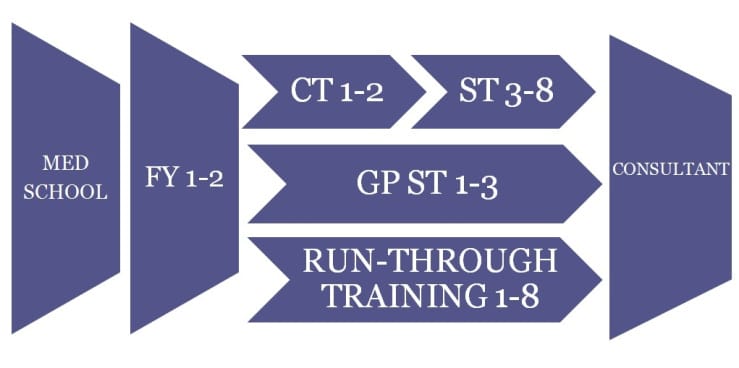
Medical Education in the United Kingdom involves basic education and training of medical doctors (MBBS in UK) to continuing education of qualified specialists (Speciality training and PG courses in UK).
Medical Schools in the United Kingdom
In the United Kingdom, medical school are departments within a university which are involved in the education and training of future medical practitioners. All leading UK medical schools are public Universities and their core purpose is to train doctors on behalf of the National Health Service.
General Medical Council- Undergraduate Study Quality Assurance
General Medical Council (GMC) is a Public body in the United Kingdom and its chief responsibility is to “protect, promote and maintain the health and safety of the public”
GMC regulates and sets the standards for medical schools in the UK, and liaises with other nations’ medical and university regulatory bodies over medical schools overseas, leading to some qualifications being mutually recognised. The body is also responsible for is responsible for a licensing and revalidation system for all practising doctors in the UK
Due to the UK code for higher education, first degrees in medicine comprise an integrated programme of study and professional practice spanning several levels. The final outcomes of the qualifications typically meet the expectations of a higher education qualification at level 7 (the UK Master’s degree). These degrees may retain, for historical reasons, “Bachelor of Medicine, Bachelor of Surgery” and are abbreviated to MBChB or MBBS
Specialty Training and Post Graduate Studies in UK
Fresh undergraduate qualified doctors enter a two-year Foundation Programme, where they undertake hands on training in a variety of different specialities. These must include training in General Medicine and General Surgery. To train as a general practitioner (GP), after completing the Foundation Programme, a doctor must complete eighteen months of posts in a variety of hospital specialities – often including paediatrics, psychiatry, geriatrics and obstetrics & gynaecology. The trainee also has to spend eighteen months as a General Practice Speciality Registrar – a trainee based in a GP practice. After completing this training and the relevant exams, the doctor can become a GP and can practise independently.
Hospital doctors are promoted after sitting relevant postgraduate exams within their chosen speciality (e.g. Member of the Royal College of Physicians MRCP, Member of the Royal College of Surgeons MRCS) and a competitive interview selection process from SHO to Specialty Registrar (StR) and eventually Consultant on completion of the CCT (Certificate of Completion of Training), which is the highest level in a speciality (with the exception of university-linked professors).
The competition is significant for those who wish to attain consultant level and many now complete higher degrees in research such as a Doctorate of Medicine (MD), which is a thesis-based award based on at least two years full-time research; or PhD, which involves at least three years of full-time research. The time taken to get from medical school graduation to becoming a consultant varies from speciality to speciality but can be anything from 7 to more than 10 years.
NHS Medical Career Grades
Continuing Medical Education
Mandatory for all doctors, under guidelines from the General Medical Council and Clinical governance.
|
Medical career grades of the National Health Service |
||||
|
Year |
Current (Modernising Medical Careers) |
Previous |
||
|
1 |
Foundation doctor (FY1 and FY2), 2 years |
Pre-registration house officer (PRHO), 1 year |
||
|
2 |
Senior house officer (SHO), |
|||
|
3 |
Specialty registrar, |
Specialty registrar, |
||
|
4 |
Specialist registrar, |
GP registrar, 1 year |
||
|
5 |
General practitioner, |
|||
|
6–8 |
General practitioner, |
|||
|
9 |
Consultant, minimum 8 years total time in training |
Consultant, minimum 7–9 years total time in training |
||
|
Optional |
Training is competency based, times shown are a minimum. Training may be extended by obtaining an Academic Clinical Fellowship for research or by dual certification in another speciality. |
Training may be extended by pursuing medical research (usually 2–3 years), usually with clinical duties as wel |
||

